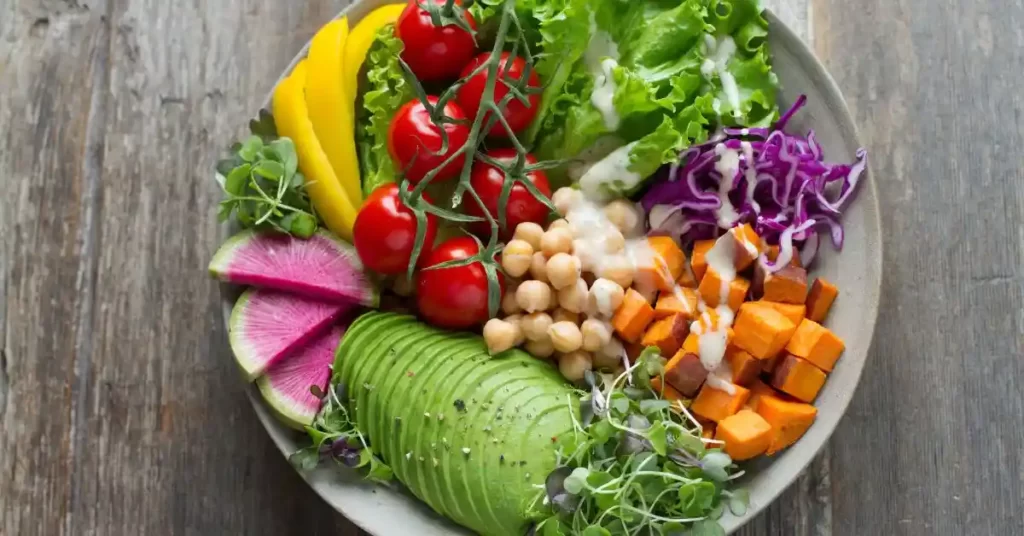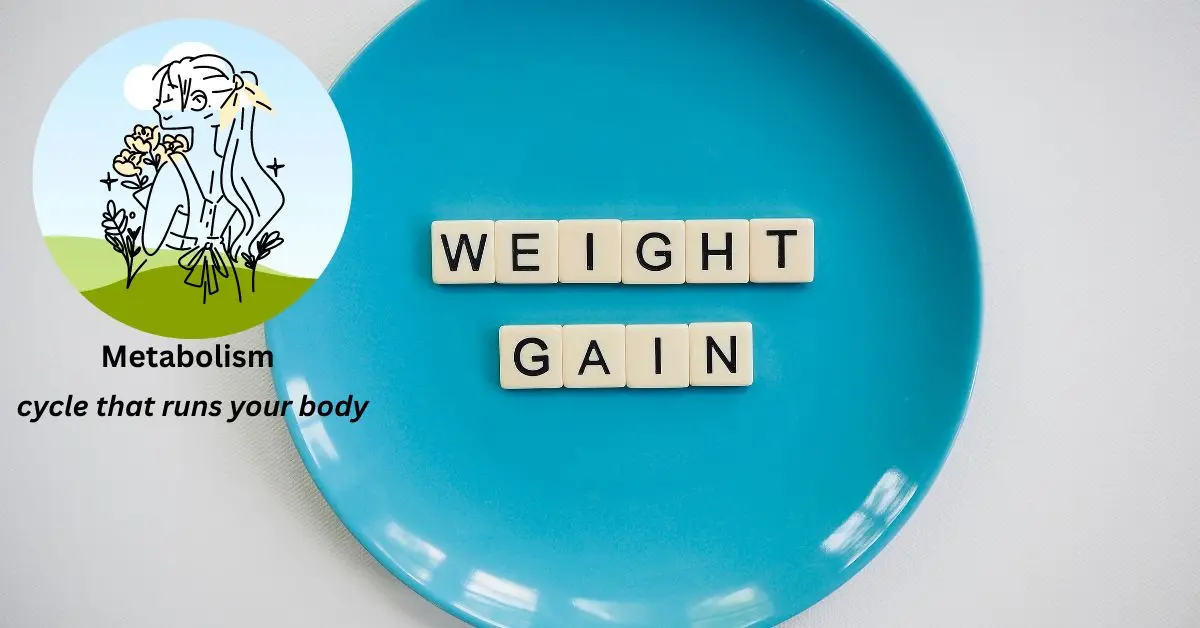Introduction
Metabolism mentions to our body’s ability to convert food or beverages into energy. The basal metabolic rate (BMR) explains the minor no. of calories our bodies require to function. Eat snacks all day, focusing on foods high in protein & less in saturated fat, like lean meats, nuts, egg whites, and low-fat dairy products. And have plenty, or your body will eat the muscle you’re trying to build. Having a fast metabolism has benefits. However, without the proper nutrition & workout routine, gaining weight can be incredibly challenging — to accomplish and comfortable. Moreover, eating many unhealthy calories from junk food or processed meals may sound like a foolproof plan. It’s not the type of healthy weight gain that will benefit us.
1. Understanding metabolism and weight gain
Metabolism permits the body to grow and function. Furthermore, It means the conversion of food into energy. It is the set of life-sustaining chemical reactions in organisms. The three primary purposes of metabolism are, Number one, the transformation of the energy in food to the power available to run cellular processes; Number two, the conversion of food to building blocks for proteins, lipids, nucleic acids & some carbohydrates, and third, the elimination of metabolic wastes. You
acquire weight when you eat more calories than you burn, or we can say burn fewer calories than you consume. However, some people lose weight more quickly and easily than others. Moreover, everyone loses weight by burning more calories than are eaten.

2. Eating for weight gain: the importance of caloric surplus
A caloric surplus gives your body the extra calories it needs to create new muscle tissue. Remembering that a caloric surplus is not a one size fits all approach is essential. Many factors, such as age, weight, exercise routine, etc., determine the size of the caloric surplus and how that surplus affects the individual’s progress. Moreover, a caloric surplus is when the number of calories you consume is higher than the number of calories you burn. In a caloric surplus, our body mass increases. So, eating in a caloric surplus benefits your muscle growth, not only in general muscle protein synthesis throughout the day but also in your energy for training. If you eat more, you will have more energy and glycogen available for training, enabling you to train harder.
3. The role of Macronutrients in weight gain
Carbohydrates, fat & protein are known as macronutrients. They are the nutrients that we use in significant amounts. Macronutrients are the nutritional part of food that the body needs for energy & to maintain the body’s structure and systems.Macronutrients are foods that are essential in large quantities in the diet. These include carbohydrates, proteins, fats, cholesterol, fibre, and water. Protein is one of the vital macronutrients for muscle growth & repair because it’s packed with amino acids that your body does and doesn’t produce. That’s why protein is critical post-workout to restore these muscle-building macronutrients.

4. Choosing the right foods for weight gain
Carbohydrates, or carbs, are a nutrient the body uses for energy. People who need to gain weight may often do this by increasing their intake of whole carbohydrates, healthy fats, and protein-rich foods. Some Examples include whole grains, dried fruit, potatoes, avocados, oily fish, eggs, or, you can say, dairy products. Moreover, People often use the term “carbs” to refer to foods mainly consisting of carbohydrates. However, those foods may contain other nutrients, too. Rice has a lower protein content, but an individual may serve it with another food, for example, meat or beans, to get more protein & calories.
Furthermore, individuals may grow the caloric value of bread by adding it to a protein-rich food, for example, nut butter or avocado. They may also prepare sandwiches containing nutrient-dense ingredients. However, Dried fruits contain fructose, which is a sugar in fruit. They are helpful as a natural sweetener & a way of increasing the calorie content of food.
The best way is Adequate protein intake is essential for each person, as it helps with muscle growth & maintenance.
In moderation, unsaturated fats benefit health, helping increase healthy cholesterol & reducing the risk of heart disease. These are also very high in calories, making them an excellent addition to any diet for weight gain.
5. Meal planning for weight gain: tips and tricks
We might have problems gaining weight for a no. of reasons. Some individual just does not eat enough or limit how much they eat. Others have a poor appetite, nausea, & an illness and do not feel like eating. Eat little, frequent meals to help build a good desire. Moreover, you can plan three meals and 2-3 snacks daily. Quick Snack ideas – crackers and cheese, yoghurt & fruit, peanut butter toast, fruit & nut mixes, hard-boiled eggs, tuna or egg salad on crackers. Quick Meal ideas – baked potato topped with chilli, vegetable and rice stir-fry, chicken or beef taco, quesadilla, bean soup. Make mealtime pleasant. Eating is more enjoyable in a comfortable, relaxed setting. Eat together as a family whenever possible. Limit distractions like cell phones and TV during meal times. Focus on eating.
6. Snacking for weight gain: healthy options to increase caloric intake
If you are demanding to gain weight,& are having difficulty maintaining your weight, you have to try adding some nutrient-rich snacks to your diet to grow your daily caloric intake. You must combine protein, fat, and carbohydrates about 2-3 hours after your last meal. Nuts and seeds contain healthy monounsaturated fats and omega-3 fatty acids, fibre, protein, antioxidants, vitamins and minerals. Fatty fish, including salmon, mackerel, sardines, anchovies and bluefin tuna, contain higher amounts of heart-healthy omega-3 fatty acids and are frequently associated with many health benefits.

7. Incorporating strength training into your routine
Do strength training exercises for all muscle groups. Aiming to do a single set of each exercise & using a weight or resistance level significant enough to tire our muscles after about 12 to 15 repetitions. Moreover, we incorporate strength training exercises into your fitness routine, and we may notice an upgrade in your strength over time. As our muscle mass increases, we’ll likely be able to lift weight more easily & for more extended periods. If we keep it up, we can continue to increase our strength, even if we’re not in shape when we begin.
8. Rest and recovery: why they matter for weight gain
Noone queries the value of training for optimal athletic performance & improvement. However, the results appear that if we get more little Sleep than we need, our weight tends to increase Sleep is super-important. Sleep poverty is link with lessened aerobic endurance & other measures of performance. It’s also related to an unfavourable exchange in hormone balance, including higher levels of the pressure hormone cortisol & lower levels of human growth hormone that is which is active during tissue repair; when sleep deprivation results in fatigue, low energy, & insufficient focus, it may increase the risk of serious injury. Moreover, rest & rehabilitation is an equally important component of an exercise scheme because it gives the body time to repair, rebuild, & strengthen itself between workouts.
9. Supplementing for weight gain: pros and cons
Mass gainer protein is a health supplementation that is put together to increase the amount of muscle in our body. That is primarily done by increasing the caloric intake of an individual & providing the body with the essential fats, carbs, & lean proteins. These are available as a powder & endorse to be ingested in the merger with a healthy balanced diet & a rigid activity regimen to encourage healthy weight gain without any unwelcome gainer side effects. However, Mass gainer protein is usually formulates using a rich blend of various sources of protein, for example, egg whites, milk protein isolates, and casein. It contains a lot of essential carbohydrates & fats based on a nutrient called maltodextrin. Mass gainer protein supplements may also have a variety of other added nutrients such as dietary fibre, fats, creatine & other such minerals to make them a complete source of nutrition for every individual. Mass gainers may help you gain weight but have specific gainer side effects if not consumed properly. Moreover, These supplements may not be compatible with our bodies & can end up having a lot of complications if used recklessly.

10. Staying motivated and tracking progress towards weight gain goals
An absence of motivation is one of the common barriers to weight gain. How motivated you are to gain weight depends on numerous factors, including where your inspiration comes from. Extrinsic motivation comes from the outside, in the form of monetary or other tangible rewards, pressure from others, the desire for approval, or negative feelings like guilt or shame. Intrinsic motivation comes from within—you’re motivated by the inherent personal satisfaction you get from doing an activity or seeing its results. Setting realistic goals—and writing them down—helps you achieve them and can lead to better health later in life. Diligently recording what you eat and how much you exercise increases your mindfulness and enables you to stay on track with your goals. It helps you evaluate what’s working best and what might not be working. Knowing you will write down what you eat and when you exercise enables you to make healthier choices. You will also learn a lot about the nutritional content of the foods you eat, which will help you make more informed decisions.
Conclusion
Metabolism mentions to our body’s ability to convert food or beverages into energy. The three primary purposes of metabolism are, Number one, the transformation of the energy in food to the power available to run cellular processes; Number two, the conversion of food to building blocks for proteins, lipids, nucleic acids & some carbohydrates, and third, the elimination of metabolic wastes. A caloric surplus gives your body the extra calories it needs to create new muscle tissue. Carbohydrates, fat & protein are known as macronutrients. They are the nutrients that we use in significant amounts. Macronutrients are the nutritional part of food that the body needs for energy & to maintain the body’s structure and systems. Carbohydrates, or carbs, are a nutrient the body uses for energy. People who need to gain weight may often do this by increasing their intake of whole carbohydrates, healthy fats, and protein-rich foods.




